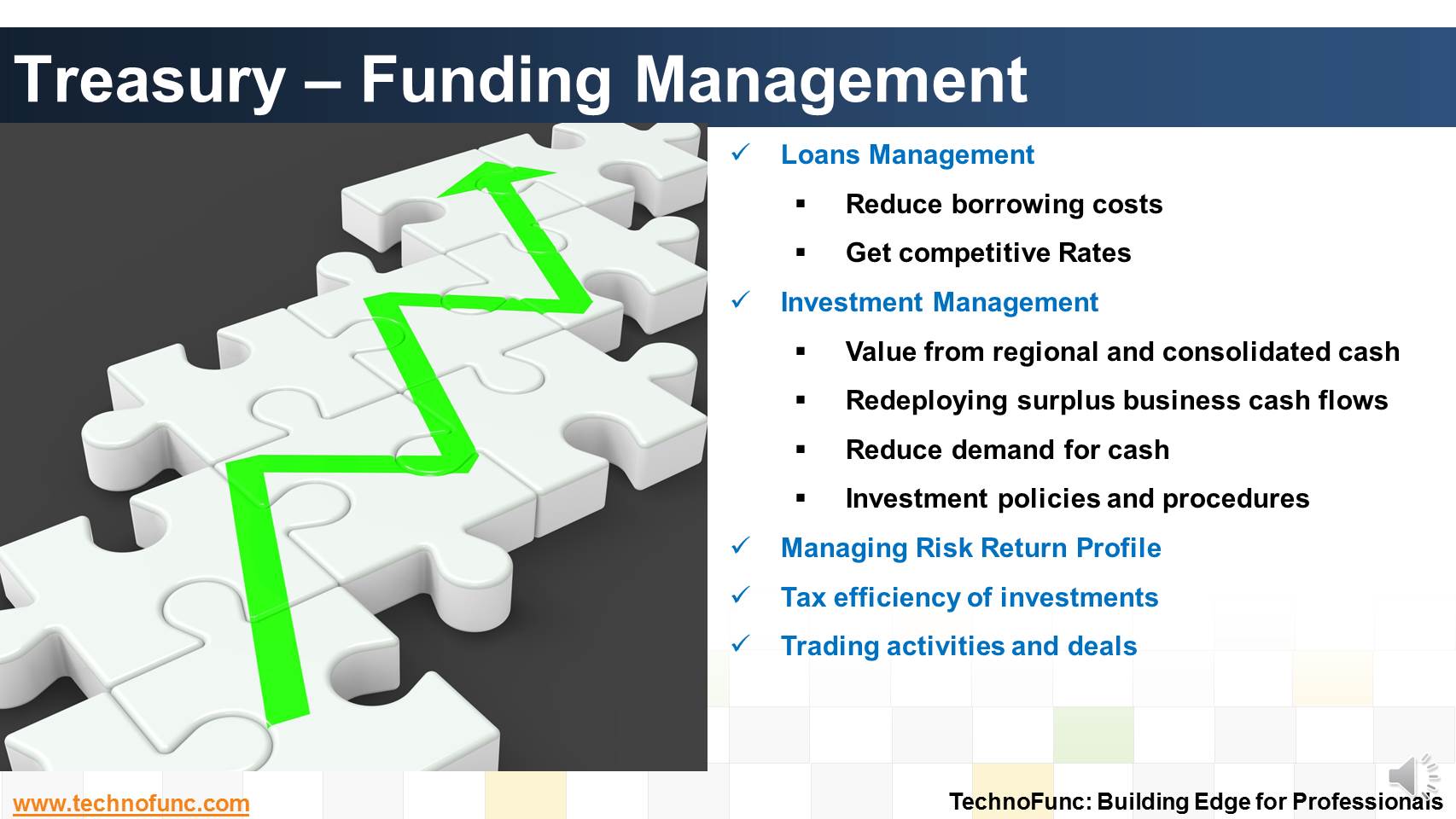- Home
- Business Processes
- Industry Knowledge
- Aerospace Industry
- Automotive Industry
- Banking Domain
- BFSI Industry
- Consumer/ FMCG Industry
- Chemicals Industry
- Engineering & Construction
- Energy Industry
- Education Domain
- Finance Domain
- Hospitality Domain
- Healthcare Industry
- Insurance Domain
- Retail Industry
- Travel and Tourism Domain
- Telecom Industry
- Leadership Skills
- eLearning
- Home
- Functional
- Treasury Management
- Treasury – Funding Management
Treasury – Funding Management
The objective of funding Management is to implement strategies that lead to the best borrowing rates and lower investment costs. Learn how treasury aids in loans and investment management functions.
The objective of Investment Management is to implement strategies that lead to the best borrowing rates and lower investment costs.
The debt and investment strategies should optimize capital structure by balancing trade-offs for debt against equity, risk, and returns.
The treasurer uses the analyses of the current liquidity and risk situation to make decisions about future investments and borrowings, taking the conditions on the financial markets into account.
Loans Management
– Borrowing and lending in the form of loans is a key element of a company's liquidity and portfolio management. Some objectives of this component are:
- To reduce financial costs of a business enterprise
- To reduce the cost of borrowings.
- Getting competitive rates on short-term debt financing.
- Identify alternative funding solutions
- Reduce banking costs.
Investment Management
- By gaining timely insight into available cash, investment returns can be maximized.
- And that translates into higher profits and faster growth.
- Drive additional value from surplus regional and consolidated cash
- Redeploying surplus business cash flows efficiently
- Reduce demand for cash
- Investment policies and procedures
Risk Return Profile should be managed to optimize investible surplus.
Tax-efficiency of investment instruments should be monitored by identifying opportunities to reduce tax liabilities and maximize cash flows.
In larger firms, treasury function will also include trading in bonds, currencies and financial derivatives.

Related Links
You May Also Like
-
Treasury Management - Functions
Treasury management has become an specialized function. Treasury function helps in managing the Risk-return profile as well as the tax-efficiency of investment instruments. In larger firms, it may also include trading in bonds, currencies and financial derivatives. Learn about the various tasks, activities and imperatives, undertaken by treasuries in in today's context.
-
Treasury has increasingly become a strategic business partner across all areas of the business, adding value to the operating divisions of the company. Managing activities that were traditionally carried out within the general finance function. Learn about the drivers for this change.
-
Although there is no straight forward answer to the question, how to best organize a treasury function, this article provides an generic view of the way large MNCs creates departments or sub-functions within the treasury function.
-
The Cash Management component ensures that the enterprise has sufficient liquidity for payments that are due and to monitor payment flows. Learn how treasury plays an important role in cash management for the enterprise.
-
The objective of Financial risk management is to protect assets and cash flows from any risk. Treasury function works to accurately assess financial risks by identifying financial exposures including foreign exchange, interest rate, credit, commodity and other enterprise risks. Learn about the various risks that are managed by treasury.
-
Technology has enabled the treasury function by providing various solutions to manage it's complicated tasks. This article explains various types of treasury management systems available in the market.
-
Treasury Management - Benefits
Effectively using treasury management with cash management and trade finance products brings tangible benefits to both corporates and financial institutions. Let us discuss some tangible benefits of treasury function.
-
The terms Treasury Management and Cash Management are sometimes used interchangeably, while, in fact, the scope of treasury management is larger and includes funding and investment activities as well. Learn all about Treasury Management here!
-
The objective of funding Management is to implement strategies that lead to the best borrowing rates and lower investment costs. Learn how treasury aids in loans and investment management functions.
Explore Our Free Training Articles or
Sign Up to Start With Our eLearning Courses

About Us
Learning
© 2023 TechnoFunc, All Rights Reserved










